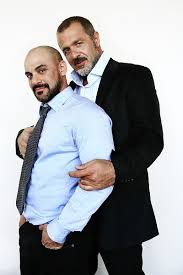
I had broken my vows to my wife, and I left her when I realized that if I made those vows again I would only betray her again. I knew my sexual attraction to men was too powerful to be contained.
If parents arranged marriages in America, our families would have put Lynn and me together. We both grew up in small towns in Nebraska where everyone looked alike and thought alike. We shared the same hardscrabble life as many in our rural community did. Our parents believed that education carved a path out of the economic wilderness.
I was thunderstruck when I met Lynn. She won my heart immediately, but I doubted I had a chance at winning hers. We became engaged during my last year in medical school and her first year of teaching, and we got married after my graduation. When we made our vows in front of family and friends, we expected to be married “till death do us part.” We didn’t make our vows with our fingers crossed.
When I was 32, I had it all. I had a wife and two daughters. I had served as a flight surgeon in the US Navy. I had completed a residency in psychiatry. We lived on a small farm on the coast of Maine—college debts paid off and a little extra money. I had realized every dream I’d had up to that point. But something wasn’t right inside me.
Then I met Roberto. With him, I experienced physical and emotional intimacy I hadn’t known before; I didn’t even know it existed.
I often hear that coming out must be a lot easier now than it was in 1986 when I left my wife. Back then, no one even whispered, “I think I might be gay.” Today, stories like that of the popular “Scary Mommy” blogger, Jill Smokler—who announced that she and her husband, Jeff, are divorcing because he is gay—have become almost routine as more and more men and women come out.
If we examine society on a macro-social level, it may be true that it is easier to come out in 2017 since being gay is much more openly discussed, but on a personal level, it remains very difficult. For example, during a talk I gave recently about coming out in midlife, a young couple began to cry, and I knew that they were in the middle of making a difficult decision about their lives. At another event, a woman told me that a member of her family had just come out to his parents, who responded, “We will not have a gay child!” A few days later he shot himself.
An article in Pediatrics reported that LGBTQ youth living in a supportive social environment are 20 percent less likely to attempt suicide than those living in less-supportive environments. A study done at the University of California, San Francisco, found that 12 percent of urban gay and bisexual men have attempted suicide, a rate three times higher than the rate in the general American adult male population.
I left my marriage at the beginning of the HIV/AIDS crisis. I knew very few gay people. I didn’t know how to begin dating as a middle-aged gay man. I worried how my daughters would introduce me to their prospective boyfriends. But although I could not see any possible gains in leaving, I knew that if I remained married, I would betray my wife again with another man.
One of my most painful moments was at my daughter’s high school graduation party. I felt like a guest among the people I considered my family. I was invited in by the man Lynn would later marry. Although he was quite gracious to me, I resented his having the role that should have been mine. It was the first time I had been with Lynn’s family since the divorce. After I quickly gulped three glasses of wine, I realized I couldn’t stay any longer. I cried all the way back to my barren apartment in Des Moines.
A sense of hope was restored after I met Doug. Lynn and I and our future spouses began to experience lighter moments together that foretold the possibility of a brighter future.
I was recently invited to speak about my book Finally Out: Letting Go of Living Straight on WOSU Public Radio. Also scheduled to be on the program was Karen A. McClintock, who was to speak about her life with her father, who had remained closeted for decades. I received a copy of her book, My Father’s Closet, to prepare for our joint interview. Even before opening the cover, I knew it was going to be an emotional read. At times, I wanted to defend McClintock’s father against her criticism of him, but I wondered, “Am I defending him, or am I defending myself?” I identified with him when McClintock wrote, “He was just a kid trying to find love in all the ways he’d been taught to do it.”
But my tears began to flow when she wrote, “Dad I always wanted more,” because I knew that my daughters felt the same way. The truth is, I wanted more of them, too. I never intended to break my vow to their mother or to walk away from them.
Our sexuality is a combination of desire, fantasy, behavior, and identity. These things are not consistent from one individual to another; they also may not be consistent in a single individual. They are not static but evolve over a lifetime. The millennial generation interprets gender roles and sexual orientation in a much less rigid and binary way than those of us of earlier generations. They speak of sexual fluidity in ways we never would have thought about.
I have never second-guessed my decision to come out. We come out to align our sexual desire and our sexual identity. We come out for those who are isolated and suffering as we were before we made our decision, those who may face the sobering thought that suicide is the only option to end their pain. We want them to know that there is hope for a new life.
I feel a sense of sadness that I could not give Lynn the dream she wanted. I feel even sadder that what I had to give my children was never enough. But all of us have evolved into much more complex individuals than we anticipated. We have expanded our world to include a new definition of family. We got through this crisis, and we have gained confidence that we will get through the next ones.



Leave a Reply